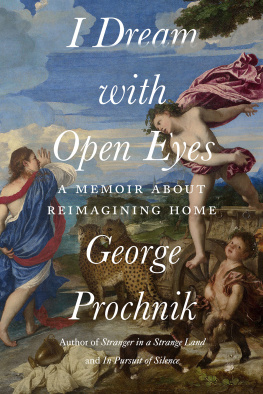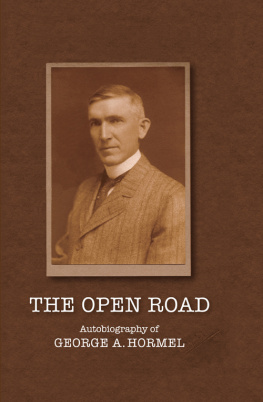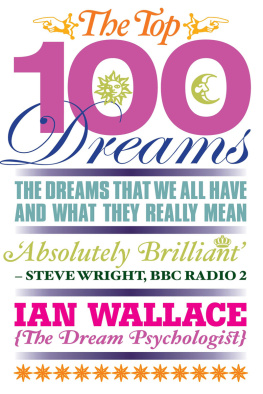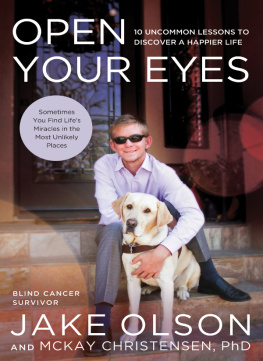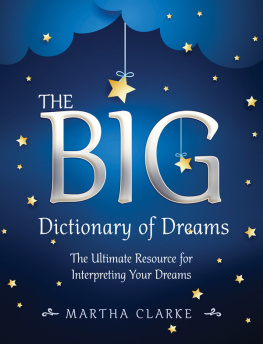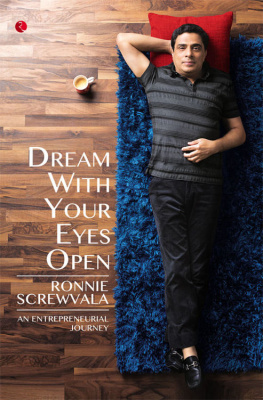Table of Contents
Guide
Page List
PRAISE FOR I Dream with Open Eyes
George Prochnik is our great biographer of migr writers, chronicling lost-and-found souls such as Heinrich Heine, Gershom Scholem, and Stefan Zweig as they flee from (and sometimes toward) disaster. In I Dream with Open Eyes, Prochnik turns his exilic gaze on his own departure from New York City in the wake of the Trump election, an ambivalent leave-taking that has inspired this extraordinary reflection on home. What is it exactly? A brownstone filled with mementoes of a family whose members range from early Puritans and friends of Emerson to Southern Confederates and associates of Freud to migrs, like Freud, from a Vienna on the cusp of catastrophe? A Brooklyn neighborhood whose rich mix of people is threatened by a mercilessly unequal economy? A country that seems thrilled to death by nihilistic behavior of all sorts? A language that is everyday more corrupted by a bullshit artist turned President and a social media complex fueled by inflammatory takes? In the midst of this conflagration, heightened by a raging virus and a suffering environment, Prochnik seizes on almost utopian moments in which alternative ways of living and loving suddenly appear. This book offers hopeful respite in that unexpected home too.
Hal Foster, author of What Comes After Farce? Art and Criticism at a Time of Debacle
In this thrillingly candid book, Prochnik examines his decision to leave his homethe United Statesand addresses questions that are becoming all too familiar and all too pressing for more and more of us: How do we proceed, how do we think, how do we understand ourselves and even our existence on Earth when social and political convulsions shatter our sense of belonging to somethingto a nation or culture? Prochnik delights us with his transportive eloquence, kindness, and erudition, the originality of his thought, and astonishing reflections on his family and background. The book shines, and in the darkness where we live now, it leaves us with an orienting and invigorated sense of possibilities.
Deborah Eisenberg, author of Your Duck Is My Duck
ALSO BY GEORGE PROCHNIK
Putnam Camp: Sigmund Freud, James Jackson
Putnam and the Purpose of American Psychology
In Pursuit of Silence: Listening for
Meaning in a World of Noise
The Impossible Exile: Stefan Zweig
at the End of the World
Stranger in a Strange Land: Searching for
Gershom Scholem and Jerusalem
Heinrich Heine: Writing the Revolution
I Dream
with
Open Eyes
A MEMOIR ABOUT
REIMAGINING HOME
George Prochnik
Counterpoint
Berkeley, California
For Elisabeth, James & Ethan
But suppose that the intelligible world is the city of words, say Utopia; and suppose that the world of that city is not a something that is outside (i.e., beyond the world of sense) but is, as it says, no place, which perhaps suggests no place else, but this place transfigured.
STANLEY CAVELL
Table of Contents
I Dream
with
Open Eyes
P art of my mothers family came over on the Mayflower, and theres a story that one of this brancha girl named Mary Chiltonwas the first of the Pilgrims to set foot on the ground of the New World. She was still only a child, just twelve years old. I like to think of her springing off that boat where theyd been confined for sixty-six days. Whatever apprehensions the adults may have been freighted with, despite the exhaustion they were certainly laboring under, I want to imagine that in the moment of watching the girl leap from the frame of the vessel, they soared through the air with her. Winged and uncontainable. This grave assembly had made the astonishing, fanatical decision to abandon civilization in order to follow commands theyd scoured from their old holy book. They were staring out at a lonely strand bordered by dead trees and harsh tangle. But the instant of absorption in that childs flight to freedom transformed their consciousness. They saw the world through her eyes, recovering a sense of unknown, boundless prospects.
The manuscript in which my mothers mother painstakingly recorded the tales of our family history vanished in the course of my journey from America. On arriving in England, I worked my way through stacks of boxes, month after month, certain that I must be on the verge of finding the slender brown volume in which shed kept the fruit of her researches, but over and over I slit open cardboard flaps to discover with a pang that it was still missing. At last I was forced to try and reconcile myself to the absence. Perhaps the chronicle had never come with us to begin with. Lost, having been set aside for safekeeping, in the last frantic phase of packing when it had seemed the task of preparing to move from our large, overstuffed house couldnt be finished, though we were on the verge of having to vacate the premises. Those days laced with little nightmares of departure: the disappearance of a beloved animal who never strayed; the discovery of a ruinous ghost mortgage taken out on the house before we acquired it; precious objects suddenly gone missing; copied identity papers found to have shed their originals. As if America itself had kept a grasp on some vital part of my being, which would mean that Id have to go back again, or would learn that Id never really left.
Sometimes I feel Ive spent my life fleeing the United States, then being swept back into the countrys wide, pillowy, warm, hot, flaming, writhing embrace. Long before I could knowingly escape, I was propelled from the place by main force. Born in Grand Junction, Colorado (I treasure that town name, evoking a theatrical crossroads, brashly colored light bulbs sizzling on and off around a cosmic marquee), I was barely six months old when my father gave up prospecting for uranium on behalf of the Atomic Energy Commission in the Southwest to try his hand at diplomacy with the State Department. He landed a post in Edmonton, Canada, after the station chief there succumbed to drink. We returned to the U.S. a couple of years later, only to leave again almost immediately for Santiago, Chile. This post lasted longer, but my mother finally put her foot down against that whole career track; fed up, my father later said, with the fuss of being a diplomats wife: all the hostess duties, twinkling in high heels and Marilyn lipstick between swells of laughter and fragrance.
It just wasnt her, my father would say with a slightly bemused shrug, arching his heavy brow.
But I see now how she couldnt stop turning her gaze back over her shoulder for the United States, all the time we lived abroad.
What was it she pined for so inconsolably? The crisp promise of real fall? A handful of chatty, eloquent friends in New England and New York whose drawling, smoky voices and dauntless, sly grins I remember rising over glasses in which the ice clacked like dominoes? A certain strain of decent gaiety? Impregnable optimism? The English language, to which her letters and speech bore such a lyrical, shape-shifting relationshipmarbled with cadences from her Bostonian mother, her Carolinian father, Edwardian childrens literature, and peak Golden Age Hollywood? Her gentle parents in their white, columned house on Main Street in Cooperstown, where shed grown up sailing turnabouts on the Glimmerglass, skiing woodland trails named after characters from the

